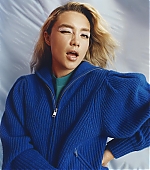TheTimes – If you don’t know Pugh already, it’s odd — not just because she’s now a bona fide star, but because she scorches up the screen in whatever she appears in. Many, for instance, will remember Midsommar, the eerie folk-tinged horror set in a Scandi commune where, as the anointed May Queen (essentially clad in a giant floral doily), her character, Dani, saw her sanity go up in flames. Others will love her performance in Fighting with My Family, playing the real-life wrestler Paige, while some might prefer a turn of a different kind — she spent much of lockdown serving up cooking videos to her Instagram Live audience. But for me it’s her Amy in Little Women, where she made the youngest March sister truly loveable as opposed to the standard stamping little brat. “I won’t do it,” she tells Timothée Chalamet’s Laurie firmly, scolding him for playing with her emotions. “Not when I’ve spent my entire life loving you.”




[…] She got her big break, while still at private school in Oxford, after attending an open audition for The Falling, an intriguing movie by the British indie auteur Carol Morley. It immediately put her on the map. “I’m so lucky that it was a real film,” she says, and by “real” she means “good”. Her next job, though, showed her a whole other world. Pugh got a part in a pilot in LA, Studio City, and she was promptly told to lose weight, wax her eyebrows and do something that was “so un-me” she groans now. “I was a baby and I thought that was Hollywood,” she says sadly. “And I thought, OK, this is how it works here. This is what they do. And then I felt stupid because I thought, well, of course, how could I come to LA and not have expected to have my weight discussed in a meeting?”
Studio City didn’t get picked up, so she returned home, shaken, and decided to focus on more interesting indies, with obvious success. All of which leads, several years later, to Black Widow. Is this her returning to Hollywood proper on her own terms? “I mean … sure!” she cackles.
Though Pugh is aware some might think it a leftfield choice, to her it made complete sense, not least because of the film’s feminist agenda. “It’s for all women,” she promises me. “It’s not just about women being powerful and strong, it’s all about women needing to carry on and survive.” In the movie she plays Yelena, a sister figure to Johansson’s Black Widow, and to say they have issues would be an understatement: “Many of our emotional scenes are in the middle of combat.” As a “very physical person” she loved the training and the preparation and did as many of the fight scenes as she could. “After having done Fighting with My Family I loved getting beaten up,” she says happily. And if Black Widow is an expensive Tinseltown juggernaut, she insists she felt no pressure to conform this time.
“It was up to me,” she says. “If I wanted to get fit, great. If I didn’t, great. How hard I wanted to go was up to me, and how I wanted to look was up to me.” She says she even had input on the suits. “I didn’t want Yelena to step into, I suppose, the old silhouette of a woman fighting.” She starts to trace something hourglassy in the air, but stops herself. “I wanted her to be in clothes she could move in.”
Lockdown gave Pugh an opportunity to pause but the results surprised her. “I realised that I was having a tough time with anxiety and I’d never had that before,” she says. “Usually I’m always on the go, I’m always moving. And when all of that was quiet and still, I was really surprised to see, or feel, that I still had a crazy amount of adrenaline running through my veins.” When I ask why, she looks more downcast. “Well, I don’t think it helped that we were going through a lot.” The “we” is her and Braff. “One of our best friends was dying of Covid” — she means their friend the Broadway actor Nick Cordero, who died of the virus last July, and whose wife and one-year-old son lived in Braff’s guest house while he was being treated in hospital. “So that obviously added a lot of emotions to the cocktail.” But she thinks it was also a broader, more existential thing: “I don’t have anxiety when I’m on a job, because I feel like I’m in the right place — this is the thing I’m supposed to be doing.”